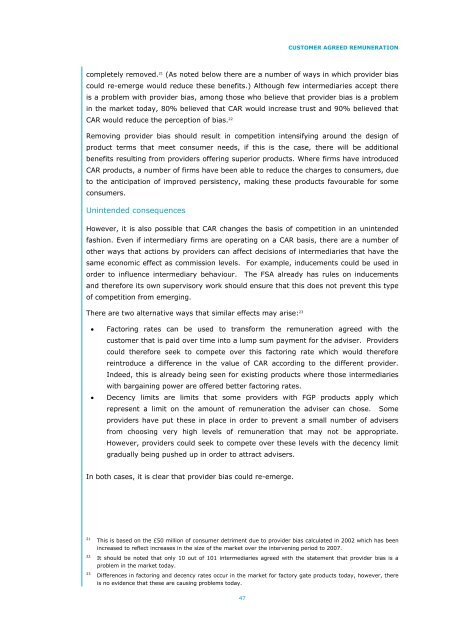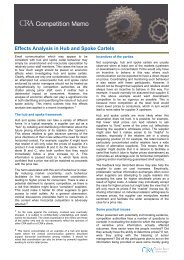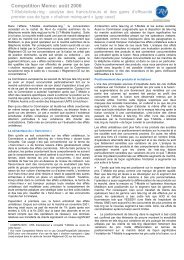CUSTOMER AGREED REMUNERATION - CRA International
CUSTOMER AGREED REMUNERATION - CRA International
CUSTOMER AGREED REMUNERATION - CRA International
Create successful ePaper yourself
Turn your PDF publications into a flip-book with our unique Google optimized e-Paper software.
<strong>CUSTOMER</strong> <strong>AGREED</strong> <strong>REMUNERATION</strong><br />
completely removed. 21 (As noted below there are a number of ways in which provider bias<br />
could re-emerge would reduce these benefits.) Although few intermediaries accept there<br />
is a problem with provider bias, among those who believe that provider bias is a problem<br />
in the market today, 80% believed that CAR would increase trust and 90% believed that<br />
CAR would reduce the perception of bias. 22<br />
Removing provider bias should result in competition intensifying around the design of<br />
product terms that meet consumer needs, if this is the case, there will be additional<br />
benefits resulting from providers offering superior products. Where firms have introduced<br />
CAR products, a number of firms have been able to reduce the charges to consumers, due<br />
to the anticipation of improved persistency, making these products favourable for some<br />
consumers.<br />
Unintended consequences<br />
However, it is also possible that CAR changes the basis of competition in an unintended<br />
fashion. Even if intermediary firms are operating on a CAR basis, there are a number of<br />
other ways that actions by providers can affect decisions of intermediaries that have the<br />
same economic effect as commission levels. For example, inducements could be used in<br />
order to influence intermediary behaviour. The FSA already has rules on inducements<br />
and therefore its own supervisory work should ensure that this does not prevent this type<br />
of competition from emerging.<br />
There are two alternative ways that similar effects may arise: 23<br />
• Factoring rates can be used to transform the remuneration agreed with the<br />
customer that is paid over time into a lump sum payment for the adviser. Providers<br />
could therefore seek to compete over this factoring rate which would therefore<br />
reintroduce a difference in the value of CAR according to the different provider.<br />
Indeed, this is already being seen for existing products where those intermediaries<br />
with bargaining power are offered better factoring rates.<br />
• Decency limits are limits that some providers with FGP products apply which<br />
represent a limit on the amount of remuneration the adviser can chose. Some<br />
providers have put these in place in order to prevent a small number of advisers<br />
from choosing very high levels of remuneration that may not be appropriate.<br />
However, providers could seek to compete over these levels with the decency limit<br />
gradually being pushed up in order to attract advisers.<br />
In both cases, it is clear that provider bias could re-emerge.<br />
21 This is based on the £50 million of consumer detriment due to provider bias calculated in 2002 which has been<br />
increased to reflect increases in the size of the market over the intervening period to 2007.<br />
22 It should be noted that only 10 out of 101 intermediaries agreed with the statement that provider bias is a<br />
problem in the market today.<br />
23 Differences in factoring and decency rates occur in the market for factory gate products today, however, there<br />
is no evidence that these are causing problems today.<br />
47




